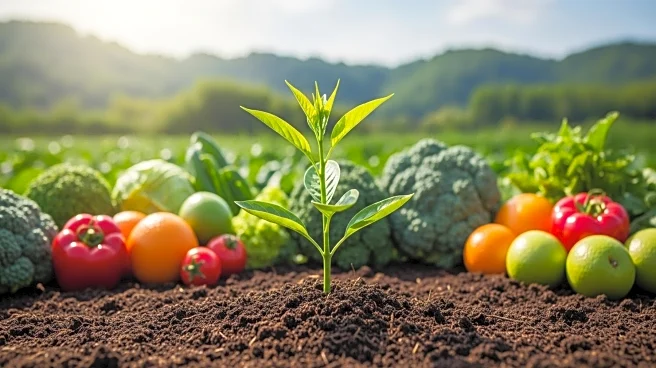What is the story about?
What's Happening?
Advancing Eco Agriculture (AEA) and Edacious have announced a strategic partnership aimed at accelerating the adoption of regenerative agriculture through advanced data-driven insights and food quality measurement. This collaboration focuses on improving soil health, crop vitality, and food nutrient density. AEA brings decades of field experience and regenerative agronomy expertise, while Edacious offers cutting-edge lab technology to measure nutrient density and safety of food products. The partnership aims to empower farmers by providing them with tools to connect their regenerative practices to measurable outcomes in nutrient density, traceability, and shelf stability. This initiative is expected to help farmers differentiate their products in the market and meet the growing consumer demand for transparency and ecological responsibility.
Why It's Important?
The partnership between AEA and Edacious is significant as it addresses the increasing consumer demand for transparency and nutrition in food production. By providing farmers with the ability to measure and demonstrate the benefits of regenerative agriculture, this collaboration could lead to a shift in how agricultural products are valued. Farmers stand to gain financially by being able to prove the quality and environmental benefits of their products, potentially leading to higher market prices. This initiative also supports the broader movement towards sustainable agriculture, which is crucial for long-term food security and environmental health. The collaboration highlights the importance of data in advancing regenerative agriculture, offering a model for how technology can support sustainable farming practices.
What's Next?
The partnership will provide AEA growers with discounted access to Edacious’s services, making high-level food quality analysis more accessible. This could lead to wider adoption of regenerative practices as farmers see tangible benefits. The collaboration is expected to set a new standard in the agricultural industry, where food quality and nutrient density become key differentiators. As the partnership progresses, it may influence policy discussions around agricultural practices and food labeling, potentially leading to new regulations that support regenerative agriculture. Stakeholders in the food supply chain, including retailers and consumers, may also respond positively to the increased transparency and quality assurance provided by this initiative.
Beyond the Headlines
This partnership could have long-term implications for the agricultural industry by promoting a shift towards valuing food based on quality rather than quantity. It may encourage other companies to invest in similar technologies and partnerships, further advancing the regenerative agriculture movement. The focus on nutrient density and food quality could also influence consumer behavior, leading to increased demand for sustainably produced food. Additionally, the collaboration underscores the potential for technology to drive innovation in agriculture, offering a blueprint for how data and science can be leveraged to improve food systems and environmental outcomes.















